Restoring Waterhouse's grave
By the start of the 21st century Waterhouse's grave at Kensal Green Cemetery in north London was in poor condition and the inscription on the headstone was illegible. In 2008 the Friends of Kensal Green Cemetery started an appeal to raise funds to restore the grave.
Photos taken prior to the restoration
These photos were taken around 2010 and show the poor condition of the grave.
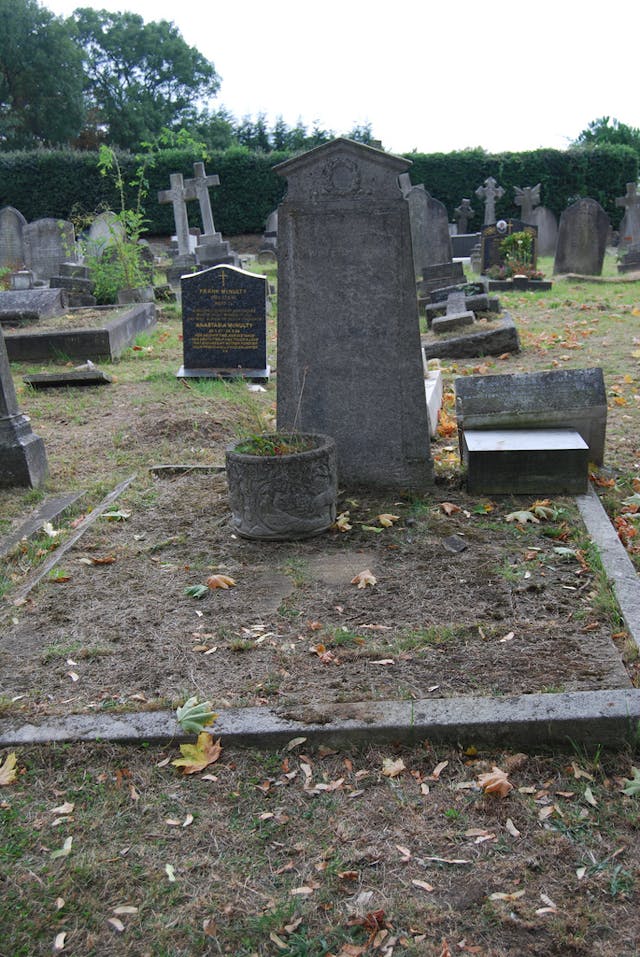
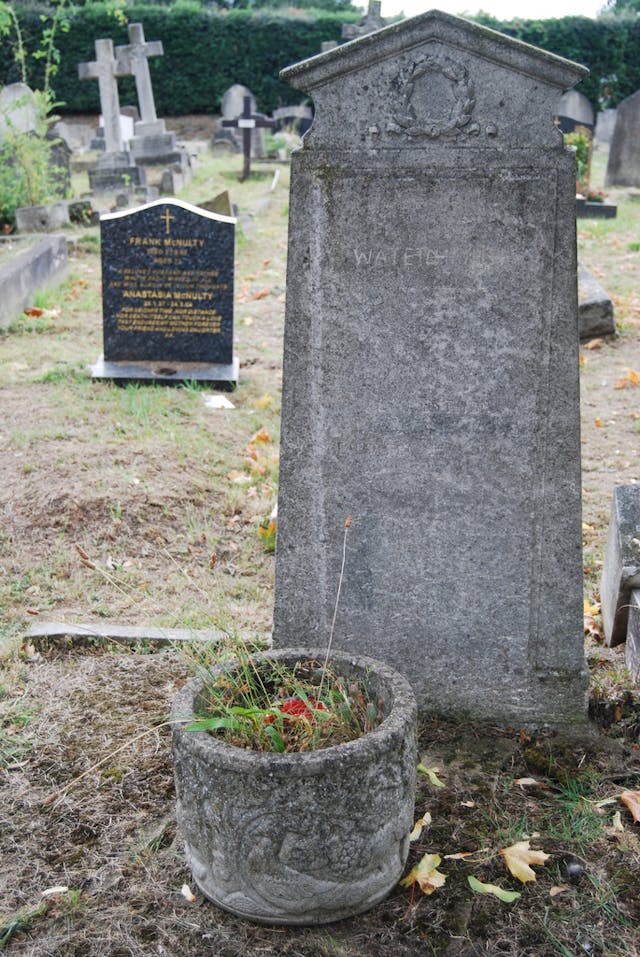
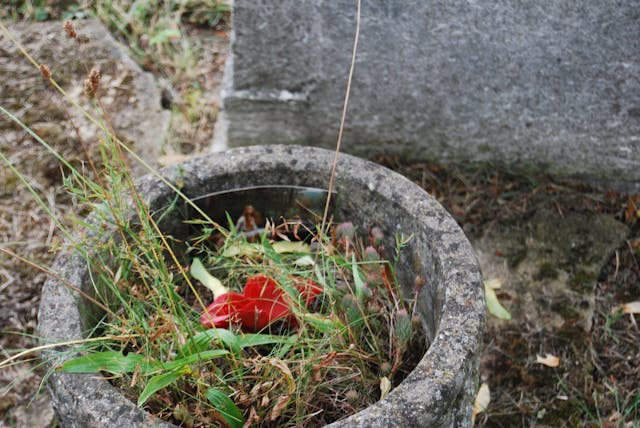
Photographs of John William Waterhouse's Grave at Kensal Green Cemetery, c. 2010
Monument Restoration Appeal
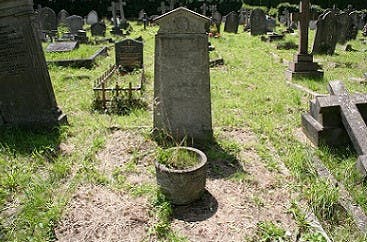
The appeal was led by Barry Smith, the chairman of the Friends of Kensal Green Cemetery, with the aim of raising £10,000. The fundraising commenced with a promotional flyer, including a photo of the current state of the Waterhouse grave, which was sent out to Friends of the Kensal Green Cemetery, researchers and art historians:
John William Waterhouse, one of Britain's foremost artists, rests with his wife Esther Maria in a quiet corner of The Cemetery of All Souls', Kensal Green, London. He is in good company, having among his eternal companions nearby the Victorian painters Frith, Callcott, Mulready, Eastlake, Hayes, Smirke, and Daniell.
His monument, a fine Portland Stone headstone with surround, is now in very poor condition and the inscription is illegible. Having recently, with the help of the Royal Academy of Arts and the Royal Borough of Kensington and Chelsea, carried out extensive conservation work to the remarkable monument above the grave of William Mulready, we are now seeking to preserve the Waterhouse grave for the future. This will involve resetting the curbs and replacing the existing headstone with a new inscribed ledger stone. The existing stone will be preserved. It is hoped that the work will be completed within 2008.
The Restoration Plan
Working together with the sculptor David Kelly and Dr John Physick, the Friends of Kensal Green finalized plans about what the restoration would involve:
the tombstone would be straightened;
a new slate plaque by David Kelly would be attached;
the curb stones reset;
removal of the standalone urn at Dr John Physick's request (don't know where this is today).
The inscription on the plaque would read
JOHN WILLIAM
WATERHOUSE
1849-1917
RA
and his wife
ESTHER
1857-1944
Above the inscription there would be a representation of an artist's palette, similar the one in the photograph taken in his studio where Waterhouse was at work on 'A Song of Springtime' (1913), together with paint brushes.
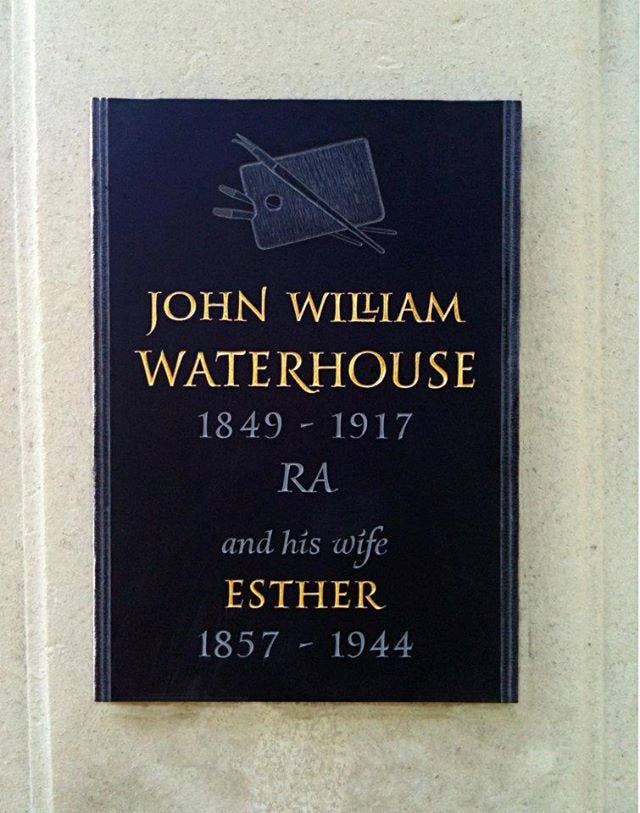
Social Media Appeal
A Facebook group was started by Cathy Baker (who also provided information to me about the restoration plan above) to raise awareness of the appeal, and eventually by 2013 enough money had been raised to complete the restoration. The Friends of Kensal Green Cemetery had kicked off the campaign with a donation of £1,000 and Dr John Physick donated proceeds raised by auctioning a Waterhouse sketch he owned. (The sketch could be this portrait of Waterhouse by William Logsdail which was auctioned in 2011).
Rededication Service
The restoration work was finally completed by 2013, and in April 2013 a ceremony to rededicate the restored grave was held at the cemetery.
Saturday, 27 April 2013
REDEDICATION OF THE RESTORED GRAVE OF ARTIST JOHN WILLIAM WATERHOUSE RA (1849-1917)
11:00, meet at the Anglican Chapel, service at the graveside in Sq. 187
With the generous support of donors including Frank van den Bos, Neil Miley and Dr. John Physick (a founder member of the Friends of Kensal Green Cemetery and the artist’s great-nephew), the monument above the grave of the artist John William Waterhouse has been restored with a new plaque by sculptor David Kelly. The rededication, in the month of the artist's birthday, will be followed by a reception in the Dissenters' Chapel.
(Note of correction: Rob Cartwright asserts that Waterhouse was born in the month of January not April).
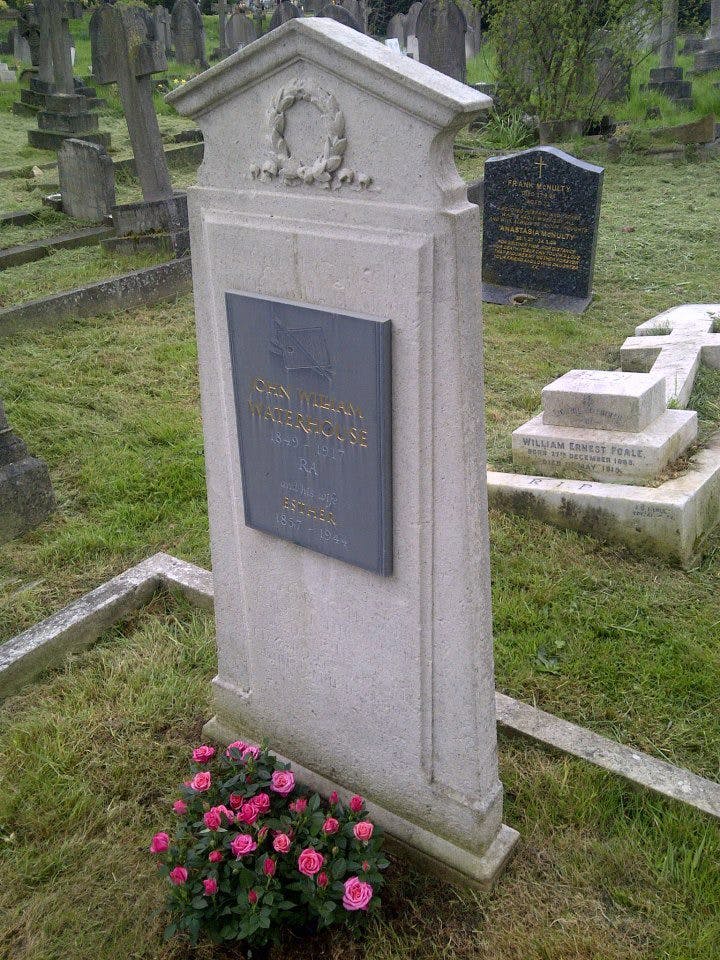
The Original Inscription
The restoration result unfortunately does not reproduce the original inscription. The appeal had stated that the restoration was required because the inscription had become impossible to read. However, it was known what the wording of the inscription was as Rob Cartwright had visited the grave in the 1970s when the inscription was still legible, and had recorded it. For cost reasons, it was decided that the attachment of the plaque was the most suitable option and this was approved by Dr John Physick, Waterhouse's great-nephew.
Rob Cartwright provides us with the original inscription:
IN EVER LOVING MEMORY
OF JOHN WILLIAM (NINO)
WATERHOUSE
ROYAL ACADEMICIAN
BORN IN ROME
JAN 16 th 1849
DIED IN LONDON
FEB 10 th 1917
ALSO ESTHER
WIFE OF THE ABOVE
DIED DEC 15 th 1944
ALSO ELIZABETH NOEL
SISTER OF THE ABOVE
AND WIDOW OF
EDWARD G SANDFORD
DIED APR 16 th 1919
Rob also tells us that the headstone is located midway between two graves – both of which were purchased by Esther Waterhouse – in Section 187, Row 2: grave no 45456 (left hand side) and grave no 45692 (right hand side); Waterhouse and his wife are interred in the former and Elizabeth Noel Sandford (eldest sister of Esther) is interred in the latter.
"To me thy dawn brings ever sweeter rest"
Distant rumblings nowadays disturb the Waterhouses' eternal rest because unfortunately the new HS2 high speed train line runs directly under their grave.
According to the Kensal Green Cemetery burial registry, John and Esther Waterhouse are buried atop one another down to 9 feet deep (information per Ken Baker and Camiel Chaudhary).
(The quote above is from a poem by Peregrine Feeney, brother-in-law to J.W. Waterhouse).
Continue reading:
The Final Resting Place
John William Waterhouse died on 10th February 1917. Following a funeral service held at St Mark's Church in St John's Wood, London, Waterhouse's body was taken to be buried at Kensal Green Cemetery in northwest London.